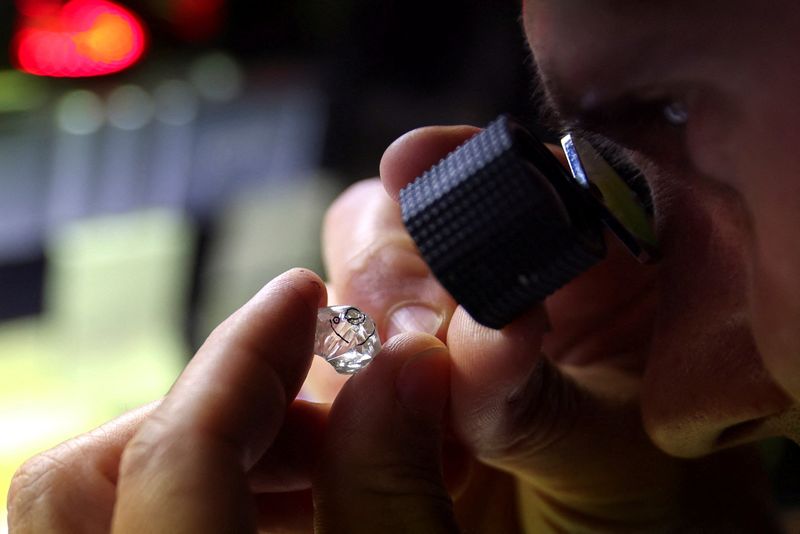By Julia Payne and Dmitry Zhdannikov
BRUSSELS/LONDON (Reuters) -The United States is reconsidering the strictest elements of a ban on Russian diamonds from the Group of Seven major democracies, following opposition from African countries, Indian gem cutters and New York jewelers, seven sources said.
The sanctions package, agreed in December and which includes a ban across the European Union, represents one of the biggest shake-ups in the sector in decades.
Two of the sources familiar with the negotiations said the Americans had disengaged from G7 working groups over the tight controls, with one describing them as “present but not involved”.
The US State Department declined to comment.
A senior Biden administration official said Washington had not changed its position and that the United States would continue to work with the G7.
“We will want to make sure we get the right balance between hurting Russia and making sure everything is doable,” said the official, who spoke on condition of anonymity.
The G7 sanctions are aimed at hitting a new revenue stream for the Kremlin’s war effort in Ukraine, even though diamonds will represent a small part of the country’s revenue in 2023 at around $3.5 billion, according to Russian state miner Alrosa’s results. profits that Moscow gets from oil and gas. .
Since March, importers in the G7 countries have had to declare that diamonds do not come from Russia, the world’s largest producer of rough diamonds. In January, sanctions were imposed on the direct import of Russian gemstones.
From September, the EU ban will require diamonds of 0.5 carats and over to pass through Antwerp, a century-old diamond hub in Belgium, for traceability certification using blockchain – the digital ledger used by cryptocurrencies.
Sources said the G7 powers had agreed that Antwerp would be the logical first hub, with others to be added later.
But three of the sources said Washington had cooled on enforcing traceability and discussions on implementing tracing had stalled.
The Biden administration official said the commitment to implement a traceability mechanism by September 1 applied to the European Union, not the United States, citing language in a statement from G7 leaders in December.
“We need to do this in a way that takes into account the concerns of African partners and African producers, takes into account Indian and UAE partners … and ensures that we can make it workable for U.S. industry as well,” the official said.
“Is there a traceability mechanism that meets all of this? We are still involved, we have not abandoned the idea. 1st.”
The presidents of Angola, Botswana and Namibia wrote to G7 leaders in February to say a predetermined entry point for the G7 market would be unfair, undermine freedoms and harm revenues. The three countries account for 30% of diamond production.
Italy, which holds the G7 presidency, declined to comment on the US position.
Any relaxation of the phased ban risks leaving loopholes and allowing Russian diamonds into boutiques in New York, London and Tokyo – a threat highlighted when Belgian authorities seized suspected Russian stones worth millions of dollars in February names.
Supporters of the sanctions say a traceability mechanism is needed to achieve a robust ban, and that without the full commitment of the United States, which accounts for 50% of the G7 diamond jewelry market, this cannot be effective. They attribute part of the decline in the sector to fears of greater market transparency.
A Belgian official familiar with the negotiations said it was paramount to maintain determination to keep the loopholes closed.
CERTIFICATE AT THE SOURCE
An earlier U.S. ban on Russian diamonds excluded stones polished elsewhere, allowing diamonds processed in India and traded in hubs like Dubai to reach the U.S. market.
The G7 ban followed months of bickering between Western capitals.
Diamond miners such as De Beers, part of Anglo American (JO:), Indian cutters and jewelers have lobbied strongly against the ban. They say the measures are poorly designed, will increase bureaucracy and drive up prices.
De Beers told Reuters it supports a ban but that diamond-producing countries must certify origin at source.
“The chances and likelihood of Russian diamonds infiltrating the legitimate supply chain are actually greater the further away you go from the source,” the company said.
Virginia Drosos, CEO of Signet, the world’s largest diamond jewelry retailer, urged the U.S. government in a letter seen by Reuters to “oppose… the G7 Belgian solution.”
Belgium has introduced a pilot exploration program in Antwerp involving around twenty diamond buyers, including French luxury groups LVMH and Kering (EPA 🙂 and Switzerland’s Richemont, one of the sources said.
An LVMH spokesperson said yes Tiffany & co (NYSE:) brand participated. Kering and Richemont made no comment.

Belgian Prime Minister Alexander De Croo told Reuters in March that he was open to establishing additional certification hubs if they met Antwerp standards, and that concerns were inevitable.
“When you implement something that changes the game, it takes some time to solve some of the problems.”





















